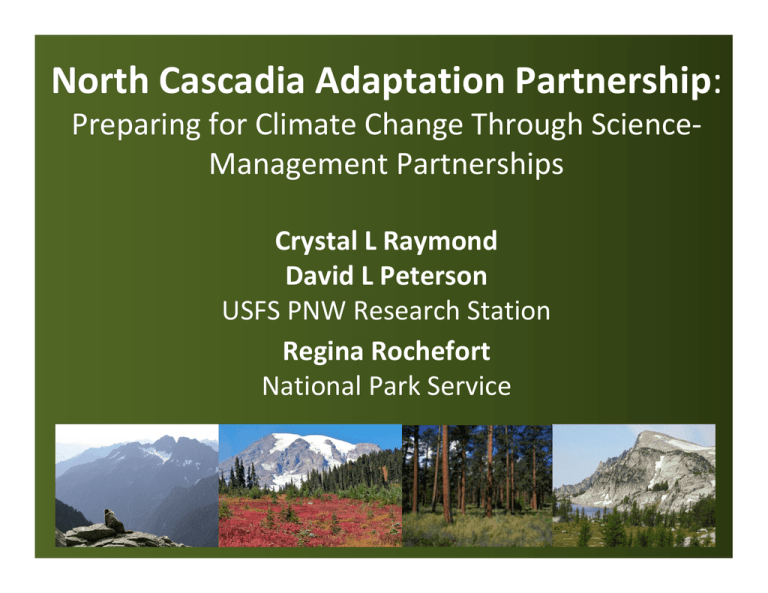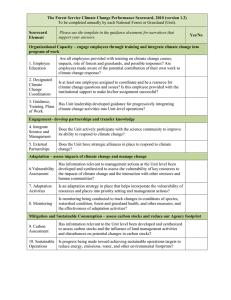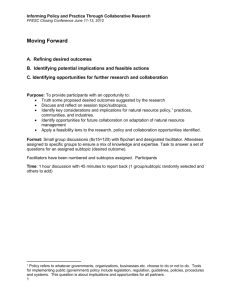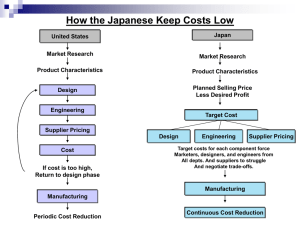North Cascadia Adaptation Partnership Preparing for Climate Change Through Science‐ Management Partnerships
advertisement

North Cascadia Adaptation Partnership: Preparing for Climate Change Through Science‐ Management Partnerships Crystal L Raymond David L Peterson USFS PNW Research Station Regina Rochefort National Park Service North Cascadia Adaptation Partnership A Forest Service – National Park Service collaboration to increase climate change awareness and facilitate adaptation planning Core Team • Forest Service PNW Station • National Park Service • Climate Impacts Group Science‐management partnership • A team of scientists and managers with multiple areas of expertise. • Focus on a consensus range of issues and resource sectors. • Work together towards final products and outcomes. Olympic Case Study Halofsky et al. 2011. Adapting to Climate Change at Olympic National Forest and Olympic National Park. PNW‐GTR‐844. Portland, OR. USDA Forest Service PNW Station. NCAP Project Area North Cascades and Mount Rainier National Parks Mount Baker‐Snoqualmie and Okanogan Wenatchee NFs All‐Lands Approach Partner Roles • Attend workshops • Learn from the process • Provide resource sector expertise • Provide perspectives on stakeholder needs • Share adaptation strategies • Contribute to written documents And many more possibilities… NCAP Process Overview 1. Education Increase climate change 2. Vulnerability awareness Assessment with park and Review climate 3. Adaptation forest staff. Planning projections and Develop science‐ identify based resource 4. Implementation adaptation sensitivities. Incorporate options. adaptation strategies into existing management plans. Forest Service Scorecard Mitigation and Sustainable Consumption 9.Carbon assessment and stewardship 10.Sustainable operations * To be completed annually by each National Forest and Grassland. Organizational Capacity 1.Employee education 2.Designated climate change coordinators 3.Program guidance USFS Climate Change Response Adaptation 6.Assessing vulnerability 7.Adaptation actions 8.Monitoring Engagement 4.Integrate science and management 5.Other partnerships NPS Climate Change Response Program • Science: develop and apply the best available climate change science. • Adaptation: incorporate climate change responses in all levels of planning. • Communication: distribute climate change knowledge internally and externally. • Mitigation: limit GHG emissions and incorporate mitigation practices. Climate Change Education • Four workshops • Participation: 60 – 115 people per workshop • Primarily park and forest staff • Climate science basics and projected effects on natural resources Vulnerability Assessment and Adaptation Resource Sector Focus Areas • • • • Fish and fish habitat (July 27 – 28) Vegetation and ecological disturbances (Nov. 7 – 8) Hydrology and access (Nov. 30 – Dec. 1) Wildlife and wildlife habitat (Jan. 30‐31, 2012) Vulnerability Assessment Existing Knowledge Trends with Recent Warming Identification of Key Sensitivities Impact Model Projections Adaptation Planning Expected Climate Sensitivities Adaptation Strategies and Tactics Timeframes Opportunities for Implementatio n Barriers to Implementatio n Products • Climate change thinking and awareness • Climate change partnerships • USFS General Technical Reports by resource sector (non‐binding reference documents) • Peer‐reviewed articles Project completion expected summer 2012 Beyond the Workshops • Current CESU ROLE and Support – NPS Task Agreement with UW CIG for Education Workshops – NPS Task Agreement with Josh Lawler (UW) to provide funding for Vulnerability Database UW, TNC, WDFW, ODFW, IDFW, NPS, NWF Next Steps • Continued Role of CESU – TAs that expand work of NCAP – Connectivity & Barriers (Josh Lawler) – Identifying Partnership Opportunities: • CSC funded Climate Fellow to support NCAP • National Park Foundation, Transportation Scholar – Support of Adaptation Tactics • Ex‐situ storage of rare plant seeds (Rare Care, UW) Beyond the Workshops • Applying/downscaling strategies & tactics to local landscapes: – Modeling climate effects on PNW wetlands: Alan Hamlet funded through LCC – Working with Canadian partners – SEEC – Spin‐ off workshops and projects: • Research, monitoring needs for wildlife • Monitoring effects of climate on wildlife: butterflies, documenting change – vegetation, amphibians For more information on the North Cascadia Adaptation Partnership (NCAP): http://www.northcascadia.org craymond@fs.fed.us regina_rochefort@nps.gov davepeterson@fs.fed.us




